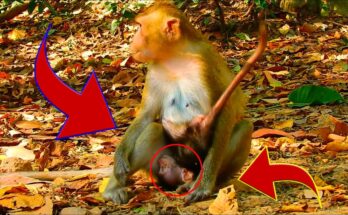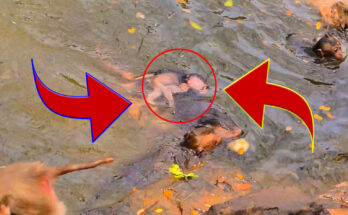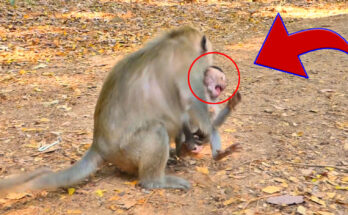In the dense, lush jungles of Southeast Asia, where the towering trees create a canopy thick enough to block out the sun, a young mother monkey, her fur matted and her energy spent, had just given birth to a tiny baby. The air was humid and filled with the sounds of chirping birds and the distant rustle of leaves as the monkeys in the troop carried on with their usual antics. For this young mother, however, the world had slowed down. Her body, which had been carrying the weight of a growing life for months, now felt heavier with exhaustion. Despite the extraordinary moment of giving life, she found herself physically drained, overwhelmed by the demands of motherhood in the wild.
The birth had been long and difficult. She had moved away from the safety of her troop to find a quiet, secluded spot in the forest to give birth. The dense foliage offered some privacy, though it did little to shield her from the physical strain of childbirth. When the baby finally emerged, she instinctively cradled the small, trembling creature in her arms. The baby, a fragile bundle of fur and soft eyes, was not yet strong enough to cling to her. The mother’s hands, trembling from fatigue, gently wrapped around the baby, instinctively seeking to protect it from the dangers of the forest.
However, as the moments passed, the young monkey’s exhaustion took a firm hold. She could barely stay awake, her eyelids heavy as the intense physical effort of childbirth weighed on her body. The jungle, once a familiar and bustling landscape of sounds and movement, seemed distant and muffled in her overwhelmed state. The baby, meanwhile, cried out weakly, its tiny limbs struggling to move in the unfamiliar world.
As nature’s cycle continued, so did the demands of motherhood. But the mother, although protective, could only do so much. She had to rest. Her instincts as a mother told her to stay close to the baby, but her body was screaming for relief. With each passing minute, her grip on consciousness loosened, and her exhaustion deepened. She lowered herself onto the soft ground, the cool earth beneath her offering some brief relief to her aching muscles.
The young mother monkey, now fully collapsed, breathed deeply, her chest rising and falling in exhausted rhythm. Her eyes fluttered shut, oblivious to the weak whimpers coming from the baby at her side. Alone, the small infant monkey lay, vulnerable and helpless. The jungle, ever the harsh and unforgiving place, paid no heed to the struggle of new life. Birds perched in the trees, ants scurried along the ground, and the wind rustled through the leaves as if nothing had changed. Yet, for the baby monkey, everything was uncertain. It knew nothing of the world outside of its mother’s protective embrace, and now, that embrace was a distant memory.
As the hours passed, the infant monkey lay alone. Its frail cries continued intermittently, but without the nurturing presence of its mother, they fell on deaf ears. The baby was in need of warmth, comfort, and milk—the essential sustenance for its survival—but the exhausted mother remained motionless beside it. Her body, which had once been alert and strong, now betrayed her as it succumbed to the weight of fatigue.
Somewhere in the jungle, other monkeys were going about their routines. The troop, perhaps unaware of the young mother’s struggle, continued their activities in the treetops. The male monkeys played, groomed each other, and searched for food, while the females went about their own tasks. None of them seemed to notice the young mother’s plight, and none seemed to be concerned about the baby left behind. The jungle’s ecosystem was vast and impersonal, and in it, the survival of each individual, whether mother or infant, depended on many factors.
The silence surrounding the mother and child was broken only by the occasional rustling of leaves or the distant calls of other monkeys. Time seemed to stand still for the small baby monkey, left alone in a world that, while full of life, could also be dangerously indifferent to the fragile existence of the young.
But as nature often demonstrates, the cycle of life is both cruel and beautiful. The mother, after a long period of rest, stirred. Her senses slowly returned, and her body, despite its exhaustion, urged her to tend to her child. She groggily rose to her feet, her movements slow and deliberate. Upon seeing her baby, she instinctively rushed to it, cradling it in her arms once again.
In the end, the baby monkey would survive—its resilience, combined with the eventual return of its mother’s care, ensured it would thrive. Yet, the episode was a stark reminder of the harsh realities of life in the wild, where survival is never guaranteed and the line between life and death is often a thin one. The exhausted mother, though overwhelmed, had shown the strength and determination necessary to raise her young. And in that moment, both mother and baby found comfort in the warmth of their bond.


